Eastern Arc Practice as Research Workshop
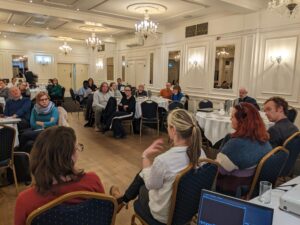 Eastern Arc hosted a one day workshop on 10 January 2023 for those working on practice as research. It was led by practitioners from the three EARC universities (UEA, Essex and Kent), and was a chance to explore the issues and opportunities facing those whose work involves a significant practice element.
Eastern Arc hosted a one day workshop on 10 January 2023 for those working on practice as research. It was led by practitioners from the three EARC universities (UEA, Essex and Kent), and was a chance to explore the issues and opportunities facing those whose work involves a significant practice element.
What follows are brief notes and links from the event. The original programme is here.
Practice Research and the REF
The first session heard from two REF sub-panellists who had assessed practice research outputs as part of their work.
- Paul Allain is Professor of Theatre and Performance at the University of Kent.He is a world-leading expert on Polish theatre and Jerzy Grotowski. He has worked extensively in the UK as a Movement Director, and has published several books, DVDs and articles on theatre and actor training. He has had several grants from the Leverhulme Trust and the AHRC and was Research Mentor for the Conservatoire for Dance and Drama, 2015-19. He was on REF sub-panel 33 (Music, Drama, Dance, Performing Arts, Film and Screen Studies)..
- Anshuman Mondal is Professor of Modern Literature at UEA, specialising in post-colonial studies. He has written on Indian literature, gender politics in Indian nationalism, modern Islam and fundamentalism, and the politics of the Middle East. He’s had funding from the AHRC, and has appeared on TV and radio, including Al-Jazeera’s ‘The Listening Post’, and Radio 4’s Moral Maze and Thinking Allowed. He was on REF sub-panel 27 (English Language and Literature).
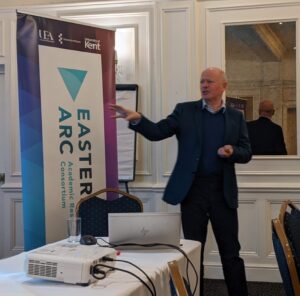 ‘Practice research is treated very positively,’ suggested Paul, ‘but rigour is vital when making the case.’ For complex or multi-component pieces, there needs to be an understandable structure with strong relationships between different elements, good signposting, and a clear articulation of the research dimension of the work. ‘The panel needs to understand the research process, and it should not be assumed’.
‘Practice research is treated very positively,’ suggested Paul, ‘but rigour is vital when making the case.’ For complex or multi-component pieces, there needs to be an understandable structure with strong relationships between different elements, good signposting, and a clear articulation of the research dimension of the work. ‘The panel needs to understand the research process, and it should not be assumed’.
His sub-panel had been surprised by the relatively low use of double-weighting in his panel: only 13.1% of outputs had used this, an increase of 3.9% on REF2014. This was, however, significantly lower than other sub panels in Main Panel D.
Anshuman saw his work as a panellist as ‘a privilege’. However, it wasn’t easy. ‘Everyone told me it would be brutal, and they were right,’ he said, and suggested that ‘creative outputs were ‘some of the best things we read.’ Through the process he had learnt a lot about the discipline, including an understanding of new fields and methodologies.
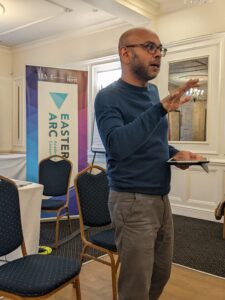 Much of the work that had been presented was ‘intensely interdisciplinary’, and this was most present in practice research. He also emphasised that ‘2* research is still good research: it is ‘nationally excellent’, and shouldn’t be dismissed or seen as a failure’. In addition, it may well lead to 4* research as it develops.
Much of the work that had been presented was ‘intensely interdisciplinary’, and this was most present in practice research. He also emphasised that ‘2* research is still good research: it is ‘nationally excellent’, and shouldn’t be dismissed or seen as a failure’. In addition, it may well lead to 4* research as it develops.
Creative non-fiction was increasingly valued, and websites were beginning to play a part, although they only formed 0.3% of all outputs. Translators were being included and recognised, and this was a ‘step-change’ in the REF.
Long-form outputs usually scored better, as it was easier to see the development of an idea. However, this was not always simple, and he gave the example of, say, a short story by Hemingway. Over time it may have been hugely influential, but that would be difficult to judge by a REF panel which had just received it post-publication.
The 300 word supporting statements weren’t always important: the importance of the work was often ‘self-evident’ in creative writing. Interestingly, his experience on the panel had rekindled his love of poetry, opening his eyes to the range and quality of work being produced at the moment.
Finally, both panellists highlighted the value of practice research in impact case studies, where they were over-represented. It was something for which practitioners should be proud. They pointed to the database of impact case studies, describing it as ‘an archive of great practice’, and encouraged colleagues to look at it for inspiration and ideas.
Effectively managing practice research
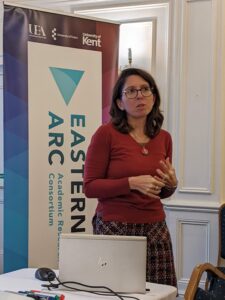 The second session was led by four academics working with practice research.
The second session was led by four academics working with practice research.
- Ambrose Gillick is a designer and researcher at Kent.He studied architecture at the universities of Manchester and Sheffield (2003-2006), and has worked for three London practices, focused on social, civic and cultural buildings and housing. He has developed a strong research interest in postmodern urban and built culture, particularly housing, and the role of grassroots and non-professional people in shaping the post-industrial city.
- Annecy Lax is a playwright and creative producer, as well as Dean of Education Partnerships and Senior Lecturer at Essex. Her research interests are in applied theatre, performing testimony, trauma in performance, the body performing protest and representations of ethics. She works with ice&fire theatre, including a recent ACE funded installation piece on the UK’s involvement in the arms trade, and with Amnesty International on a succession of performance provocations and short films.
- Mary Mazzilli is a playwright, poet, novellist, dramaturge, director and producer, as well Acting Deputy Dean and Senior Lecturer in the Department of Literature Film and Theatre Studies (LiFTS) at Essex. She is the founder and Creative Director of Lumenis Theatre Company, and her plays have been widely staged in both the UK and China.
- Amy Sackville is a novelist and prose writer. She is Senior Lecturer in Creative Writing and Deputy Head of the School of English at Kent. Her first book, The Still Point, was awarded the John Llewellyn Rhys Prize for a work of literature by a writer under 35; it was also long-listed for the Orange Prize for Fiction and the Dylan Thomas Prize. Her second, Orkney, won a Somerset Maugham award.
They spoke about their individual experience of practice research, but also took part in a panel session where they discussed their work with each other and responded to questions from the floor.
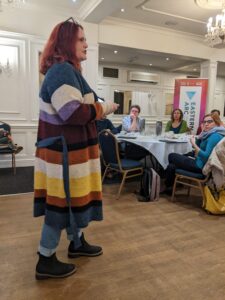 A number of key points emerged from these discussions.
A number of key points emerged from these discussions.
- Don’t worry too much about framing the research questions initially. These can emerge from the practice and development of the work.
- The questions need to be ‘inflected’ by other disciplines
- Don’t be afraid of coming back to elements of your work, or ‘unpacking’ it further.
- It is important to document your work. The value of doing so is fourfold:
- It helps to articulate the process and development of your research;
- It provides methodological evidence;
- It offers a way to understand and articulate the questions and aims of your work;
- It gives you a framework for your research.
- Be precise in the way you articulate your work. It sounds simple but is very difficult.
- Practitioners have a very different view of research and the outcomes from it. ‘Academics like to mark pieces of paper,’ suggested Annecy, and it’s important to understand different perspectives when collaborating with those outside of higher education.
Funding for practice research
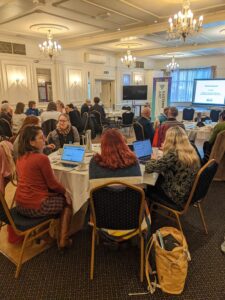 The final joint session heard from two experienced academics who talked about their funding journey, and the different opportunities open to them. Paul Allain (Kent) talked about smaller international or discipline-specific funders; Paola di Franco (Essex) spoke about her experience in getting a UKRI Future Leader Fellowship.
The final joint session heard from two experienced academics who talked about their funding journey, and the different opportunities open to them. Paul Allain (Kent) talked about smaller international or discipline-specific funders; Paola di Franco (Essex) spoke about her experience in getting a UKRI Future Leader Fellowship.
- Paola di Franco is a Senior Lecturer in Heritage and Digital Humanities at Essex. Her research combines material culture, heritage, and cognitive science to explore how new technologies impact heritage making processes and the interpretation processes of the past. In the past she was one of the original Eastern Arc fellows, and Marie Skłodowska Curie fellow at Cambridge. Currently she is a UKRI Future Leader Fellow with a project that aims to increase community resilience after natural disasters by advancing our understanding of the socio-cultural role 3D technologies can play in rebuilding a sense of place.
For smaller funders, the process of applying is usually relatively simple and informal, and the chances of success are high. For the latter, it can be a huge commitment, requiring significant time, energy and effort. The pay off is that the funding tends to be much larger and the recognition (and potential for promotion or other benefits) much greater.
An overview of funding available for practice research is available here (pdf) or go to our Issuu bookshelf here.
Future activities
It was agreed that a workshop or mini-conference be organised to showcase different PAR projects. Details are still to be agreed, but if you would like to be updated on this, contact us.
